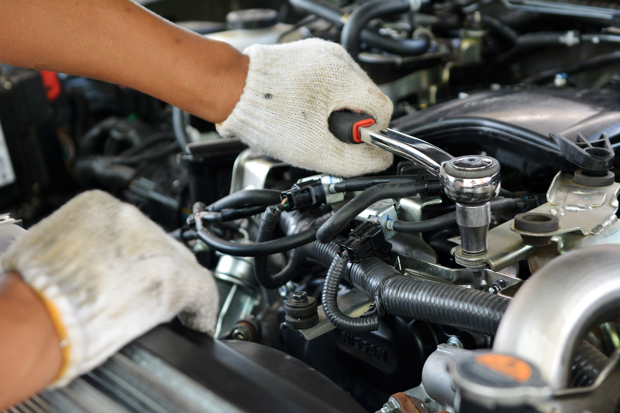Is a used car warranty worth the money?
You've been told your new car comes with a warranty, but do you know what it covers or how to use it? Our complete guide explains everything.

- What does a car warranty cover
- Is an aftermarket warranty worth it?
- Where to buy a car warranty
How does a car warranty work?
Essentially a contract between the manufacturer or seller of a vehicle and the customer, a car warranty outlines who will cover the cost of fixing it should it break down.
These agreements usually make it clear that if the failure is due to a manufacturing defect, then the cost will be covered by the warranty provider, but if it's down to the car not being looked after properly, it's usually the customer who foots the bill.
Warranties provide customer protection against having to incur any costs for replacement parts and labour which can be very expensive when a design defect is involved.
As with all forms of cover, warranties aren't all created equal, so it's important to check what your car's warranty includes and what conditions may apply, such as excess charges and mileage- or vehicle age-related restrictions.
Warranties don't cover wear and tear items such as tyres or brake pads, but do tend to cover things like the engine or motor, batteries, fuel systems, transmission, suspension, brakes and steering. However, the devil is in the detail, or in this case, the small print.
Best GAP Insurance Offers & Discount Codes
MotorEasy Warranty - £75 Off* 
Protect your vehicle against expensive mechanical and electrical repair bills with a warranty. Get £75 off a 12 month MotorEasy warranty plan when you use our exclusive code HJ75 at the checkout.
This code can not be used with any other offer or discount.

What does a car warranty cover?
Every aftermarket warranty provider will extol the virtues of their policy, but they are not all the same. At the bottom end of the market, you may find only the major components of the engine and gearbox are included. And as they rarely go wrong you may not be able to claim for any work.
More expensive and comprehensive policies claim to cover every part of the car should it go wrong. If you’re not certain about what that includes for your car, ask before paying for the policy.
As well as the price of replacement parts to fix the car, you should compare each policy for how much it will contribute to the cost of labour. Some cover will have a very high labour rate cap, so you can be sure the car will be repaired at an approved dealer or independent garage. Those with much lower labour caps could mean you taking the car to a garage you might not want to.
Some policies will come with roadside assistance or breakdown cover. If you already have this separately or through your insurance or bank account, you could end up paying more for something you don’t need.
What's not covered by a car warranty?
Like all insurance policies, aftermarket car warranties can be littered with clauses that mean the provider doesn’t have to pay out in the event of a claim. Read the small print thoroughly.
Even then, there will almost certainly be exclusions. These can be for time limits, so you cannot claim within the first 90 days of buying the policy. You might also find the cover doesn’t protect you from ‘consequential loss’ where the failed part damages another component.
Other exclusions to look for are capped labour rates and claim limits that restrict how much of the repair cost you can get back. Also, some warranties only pay a portion of labour rates depending on the age of the car, so the older your vehicle the less the policy will contribute for the mechanic’s time. If a fault needs to be investigated before it can be repaired, the cost of the diagnosis is often not part of the policy and you’ll have to pay for this.
Is it worth buying a vehicle warranty?
Modern cars are more reliable than ever, so whether you decide to opt for an aftermarket warranty either from a dealer or third party provider comes down to how risk averse you are. For those who like every eventuality taken care of, a warranty is a must. However, it’s worth remembering the cost of the warranty may outweigh any claim you make or the bill for repairs, especially when you have to pay an excess.
For this reason, aftermarket car warranties are not for everyone. If you’re confident your car is in good condition and will continue to work as it should, then the occasional servicing and repair bill will not come as much of a shock to the finances.
How much does a car warranty cost?
You pay your money and take your choice with used car warranties. There are some available for less than £200, while the most expensive are around £650. You also have to factor in any excess you will have to pay towards a repair to decide whether cover is worth having or if it makes sense to put in a claim as the excess can be £250.
Generally, the more expensive the cover, the more you can claim for, but you must read the small print to know exactly what’s included or not. You can often add in specific items to be covered to an aftermarket warranty policy, but this will increase the price.

Where should I look for a used car warranty?
Once the manufacturer's warranty runs out, you have several options. The first is to sell the car, take a hit on depreciation, buy a new one and benefit from the fresh manufacturer's warranty.
The second is to do nothing and cover the costs out of your own pocket. This is a bit of a lottery as sometimes you'll get lucky and nothing will go wrong, while other times you could be left with a big bill.
Another option is to opt for a manufacturers' extended warranty. These can be on the pricey side and aren't always available on all models.
This is where warranty specialists such as MotorEasy*, Click4Warranty, Warranty Wise and ALA - provided by the RAC come in.
These companies offer warranty cover for most makes and models and usually cost less than main dealers. Shop around for the best cover, but make sure that you're comparing like-with-like as what is covered in a warranty varies from company to company.
Cover levels vary widely and purchasers should be careful to check out excesses, cover levels, claim limits and conditions. In recent times the major breakdown recovery providers have offered schemes such as Parts and Labour Cover and Breakdown Repair Cover.
Unfortunately, these only cover you if you are on a journey at the time of breakdown (or at home, if you have already purchased their expensive home assistance package). Very few warranty claims materialise at the time of a breakdown so payouts are likely to be minimal.
How long does a car warranty last?
All new cars come with a warranty. Some manufacturers will provide a three-year warranty while other carmakers, like Hyundai and Kia, will provide a respective five and seven year deal. With any new car purchase, it's always worth getting familiar with what the warranty covers, and what its limitations are - the most obvious being the mileage.
Others carmakers have followed Hyundai and Kia's lead with longer and more comprehensive warranty packages, including Toyota.
However, Toyota's deal starts at the standard 3 years, but extends by 12 months each year up to 10 years or 100,000 miles. The catch? As with many manufacturers, an extended warranty is an incentive to keep the car (and its annual servicing costs) within its dealer network.
How do I compare warranty cover levels?
The make and model of your car is largely irrelevant when choosing a car warranty unless you drive a supercar. What is important is the age and mileage of the vehicle. Most aftermarket warranty providers won’t cover cars more than 10 years old and above 100,000 miles. I
f your car is closing in on either of the figures, you will probably be declined cover as the warranty company sees you as too great a risk.
There are aftermarket warranties for higher mileage cars that cater for vehicles up to 12-years old and up to 150,000 miles. However, they cost more and often have added restrictions about what parts and repairs are included in the warranty.
Depending on the provider and level of cover you choose, an aftermarket warranty can cover the basics of the engine and gearbox only. The more comprehensive policies cover every part of the car, though this is based on the vehicle being in tip-top condition when you buy the cover. When you are choosing a warranty, read the small print very carefully to be sure of what is covered.
You also need to make sure how much the policy will pay out for labour rates at a garage. Some may only cover this at approved repairers and there is often an upper limit. You should also be aware of ‘betterment’ where a repair makes your car more valuable than before as this can mean the warranty provider will expect you to contribute to the final bill.
Always check the easily missed 'terms and conditions'...
Insurance and aftermarket warranties are liberally dotted with jargon that can seem confusing or is easy to gloss over as you rush to pay for the policy. However, take the time to read it all as it can be the difference between having a policy that covers you against a problem with your car and something not worth the paper it’s written on.
Among the key words and phrases to look out for are ‘excess’ and ‘time limits’. An excess is how much of the repair bill you will have to pay before the provider contributes. A time limit means you cannot make a claim within a certain period of taking out the policy, usually 90 days.
Other important words to look for include ‘pre-existing faults’ that refers to damage on the car before the cover started. Keep your eyes out for ‘betterment’ where a repair adds to the car’s value and you may be asked to pay some of the bill. And any policy must state clearly the warranty company is a ‘regulated provider’ that is governed by the Financial Conduct Authority. This allows you a 14-day cooling-off period after buying the warranty if you change your mind and decide not to go ahead with it.
Car Warranty FAQs
What sort of problems can arise with a car warranty?
The most common problem with warranties is the provider refusing to make a repair or pay for the remedial work. This can be due to a number of reasons, including the provider claiming your car is too old or its mileage exceeds the terms of the contract.
You might also find a warranty company or car maker refusing to cover the cost of repairs because your car has not been properly maintained according to the maker’s service schedule. Another is that inferior or non-original parts have been fitted to the car as part of a routine service or previous repair work.
With aftermarket warranties, if you go ahead and have repairs made to the car without the warranty company first approving them, the firm is quite likely to turn you down for reimbursement as it didn’t authorise the work. It may also claim the garage is not an approved supplier.
One other regular issue that comes up with warranties is the policy does not pay out for the whole cost of a repair. This can be because the labour rate charged by the appointed garage is too high, the price of the fix exceeds the value of your car or your policy has a price limit in place.
How can I avoid problems with a car warranty claim?
The first thing you need to do is read all of your warranty policy documents very carefully when you take out the cover and before making a claim.
Be certain that what you want to claim for will be covered under the provider’s terms and conditions and state this clearly when you make the claim. You may find there are exclusions you didn’t realise that prevent you from making a claim or that you’re covered for more work than you originally thought.
The key to smooth claims process is to maintain contact with the warranty provider at all times, regardless of whether it’s a manufacturer-backed policy or one from a third party provider. Always be polite, clear in what you want to happen and ensure you know that the policy covers you for the intended repair work.
If the warranty provider refuses your claim or declines to pay for work, ask them to set out their reasons in writing to explain, in detail, why they are not agreeing to fix your car.
Perhaps most importantly of all, do not be fobbed off by a warranty provider or dealer. Many will try to draw out the process for as long as possible in the hope you will get bored or need your car fixed in hurry. This tactic relies on you going away and not bothering them again. Don’t do this. Keep phoning and, most importantly, writing to ask what stage the process is at and ask for all explanations to be given in writing.
If this doesn’t work, you may have to take the car to a few garages to get quotes for the repair work. Tell the warranty provider that you will have the car repaired and then claim the cost of the work back from them unless they agree to authorise the work and pay for it.
In some cases, the provider will continue to deny your claim. This is where legal redress starts, but you should check whether the warranty company is regulated by the Financial Conduct Authority and if it’s accredited by the Motor Ombudsman.
Complaining about a company to a trade body is often enough to prompt a resolution. In the event this doesn’t work, your next step is to involve the Financial Ombudsman Service. You will need to prove that you have given the warranty company every reasonable opportunity to resolve the problem through its own complaints system and more than eight weeks have elapsed since you made the provider aware of the problem.
If none of this works, you may have to resort to court action, which is expensive and there’s no guarantee you will win your case. If this is the only option left, the Courts and Tribunal Service will advise you or you may engage a solicitor to pursue the case for you.

What protection do I have on a car warranty?
If you have a complaint about a warranty provider, you need to address this to the Financial Ombudsman Service, which is independent of the FCA or, alternatively, the Motor Ombudsman.
If you bought the car from October 2015 onwards, you’re covered by the Consumer Rights Act. This states the car must be deemed by the dealer to be of a satisfactory quality for its age and value. Cars bought before October 2015 are dealt with by the Sale of Goods Act, which is not quite as comprehensive as the Consumer Rights Act but still gives you protection in law against faulty goods.
How much will a warranty cover the cost of a repair?
This might sound like a silly question when the whole point of an aftermarket warranty is to pay for repairs, but you’d be surprised. Many warranty providers will find reasons not to pay out, such as claiming the fault was pre-existing so it was already there before you claimed. Other reasons not to pay out include a part not being covered on the policy.
You should be aware of ‘consequential loss’ where the broken part damages another. In many cases, the policy will only pay to replace the main damaged component and you will have to foot the bill for any other work or parts.
Capped labour rates are another way aftermarket warranty providers reduce the amount they pay out. By limiting how much they will approve for an hourly labour rate, they lessen their pay-out to you. This can mean your car being fixed by a garage you are not happy to use or is inconvenient to get to.
What restrictions do warranties have?
As with all insurance policies, aftermarket warranties can come with lots of small print that protects the provider rather than you and your car. The most obvious restrictions will be the age and mileage of the car when you take out the policy. If your car exceeds either of these limits while the policy is still active, it will not pay for repairs.
You also need to be able to prove you keep your car in good condition by having it regularly maintained according to the service schedule. If not, the policy provider can refuse to pay out because you have neglected the vehicle’s condition.
More restrictions come in the form of a claim limit, so you can only claim up to a set amount for every repair. There may also be a fixed number of claims you can make in a 12-month period.
Wear and tear items are usually not covered and ‘consumable’ items like tyres and brakes will be excluded from any claim. You find the provider says a fault is ‘pre-existing’, which means it was there before the policy started and they won’t cover it.
